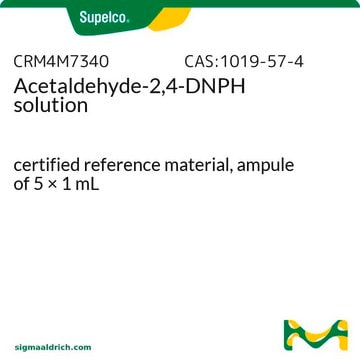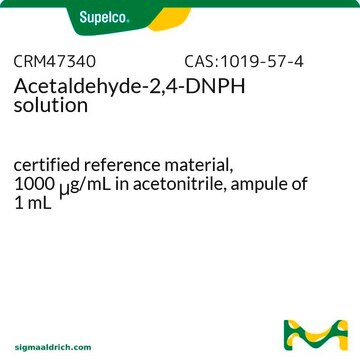442597
Formaldehyde-2,4-DNPH
analytical standard
Synonym(s):
Formaldehyde-2,4-dinitrophenylhydrazone
About This Item
Recommended Products
grade
analytical standard
CofA
current certificate can be downloaded
feature
standard type calibration
packaging
ampule of 100 mg
technique(s)
HPLC: suitable
gas chromatography (GC): suitable
mp
153-156 °C (lit.)
application(s)
environmental
format
neat
storage temp.
2-30°C
SMILES string
[O-][N+](=O)c1ccc(NN=C)c(c1)[N+]([O-])=O
InChI
1S/C7H6N4O4/c1-8-9-6-3-2-5(10(12)13)4-7(6)11(14)15/h2-4,9H,1H2
InChI key
UEQLSLWCHGLSML-UHFFFAOYSA-N
Looking for similar products? Visit Product Comparison Guide
General description
Application
Signal Word
Warning
Hazard Statements
Precautionary Statements
Hazard Classifications
Eye Irrit. 2 - Skin Irrit. 2 - STOT SE 3
Target Organs
Respiratory system
Storage Class Code
11 - Combustible Solids
WGK
WGK 3
Flash Point(F)
Not applicable
Flash Point(C)
Not applicable
Choose from one of the most recent versions:
Already Own This Product?
Find documentation for the products that you have recently purchased in the Document Library.
Our team of scientists has experience in all areas of research including Life Science, Material Science, Chemical Synthesis, Chromatography, Analytical and many others.
Contact Technical Service




